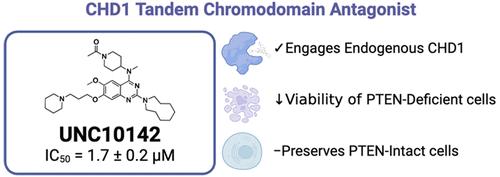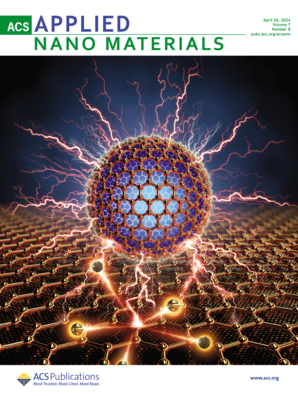Discovery of CHD1 Antagonists for PTEN-Deficient Prostate Cancer
IF 5.3
2区 材料科学
Q2 MATERIALS SCIENCE, MULTIDISCIPLINARY
引用次数: 0
Abstract
CHD1 is a chromodomain-helicase DNA-binding protein that preferentially recognizes di- and trimethylated lysine 4 on histone H3 (H3K4me2/3). Genetic studies have established CHD1 as a synthetic lethal target in phosphatase and tensin homologue (PTEN)-deficient cancers. Despite this attractive therapeutic link, no inhibitors or antagonists of CHD1 have been reported to date. Herein, we report the discovery of UNC10142, a first-in-class small molecule antagonist of the tandem chromodomains of CHD1 that binds with an IC50 of 1.7 ± 0.2 μM. A cocrystal structure revealed a unique binding mode and competition pull-down experiments in cell lysates confirmed endogenous target engagement. Treatment of PTEN-deficient prostate cancer cells with UNC10142 led to a dose-dependent reduction in viability while PTEN-intact prostate cancer cells were unaffected, phenocopying genetic loss of CHD1. Overall, this study demonstrates the ligandability of the CHD1 chromodomains and suggests more potent and selective antagonists could translate to compounds of therapeutic value in PTEN-deficient cancers.

发现治疗 PTEN 缺失型前列腺癌的 CHD1 拮抗剂
CHD1 是一种染色质链-螺旋酶 DNA 结合蛋白,能优先识别组蛋白 H3(H3K4me2/3)上的二甲基化和三甲基化赖氨酸 4。遗传学研究证实,CHD1 是磷酸酶和天丝同源物(PTEN)缺陷癌症的合成致死靶点。尽管CHD1与治疗有着诱人的联系,但迄今为止还没有关于CHD1抑制剂或拮抗剂的报道。在此,我们报告了UNC10142的发现,它是CHD1串联染色质的第一类小分子拮抗剂,其结合的IC50为1.7 ± 0.2 μM。共晶体结构揭示了其独特的结合模式,细胞裂解物中的竞争性牵引实验证实了其与内源性靶点的结合。用 UNC10142 处理 PTEN 缺失的前列腺癌细胞会导致活力的剂量依赖性降低,而 PTEN 缺失的前列腺癌细胞则不受影响,这与 CHD1 基因缺失的表型相似。总之,这项研究证明了 CHD1 染色体域的配体性,并表明更强效和更有选择性的拮抗剂可以转化为对 PTEN 缺失型癌症有治疗价值的化合物。
本文章由计算机程序翻译,如有差异,请以英文原文为准。
求助全文
约1分钟内获得全文
求助全文
来源期刊

ACS Applied Nano Materials
Multiple-
CiteScore
8.30
自引率
3.40%
发文量
1601
期刊介绍:
ACS Applied Nano Materials is an interdisciplinary journal publishing original research covering all aspects of engineering, chemistry, physics and biology relevant to applications of nanomaterials. The journal is devoted to reports of new and original experimental and theoretical research of an applied nature that integrate knowledge in the areas of materials, engineering, physics, bioscience, and chemistry into important applications of nanomaterials.
 求助内容:
求助内容: 应助结果提醒方式:
应助结果提醒方式:


